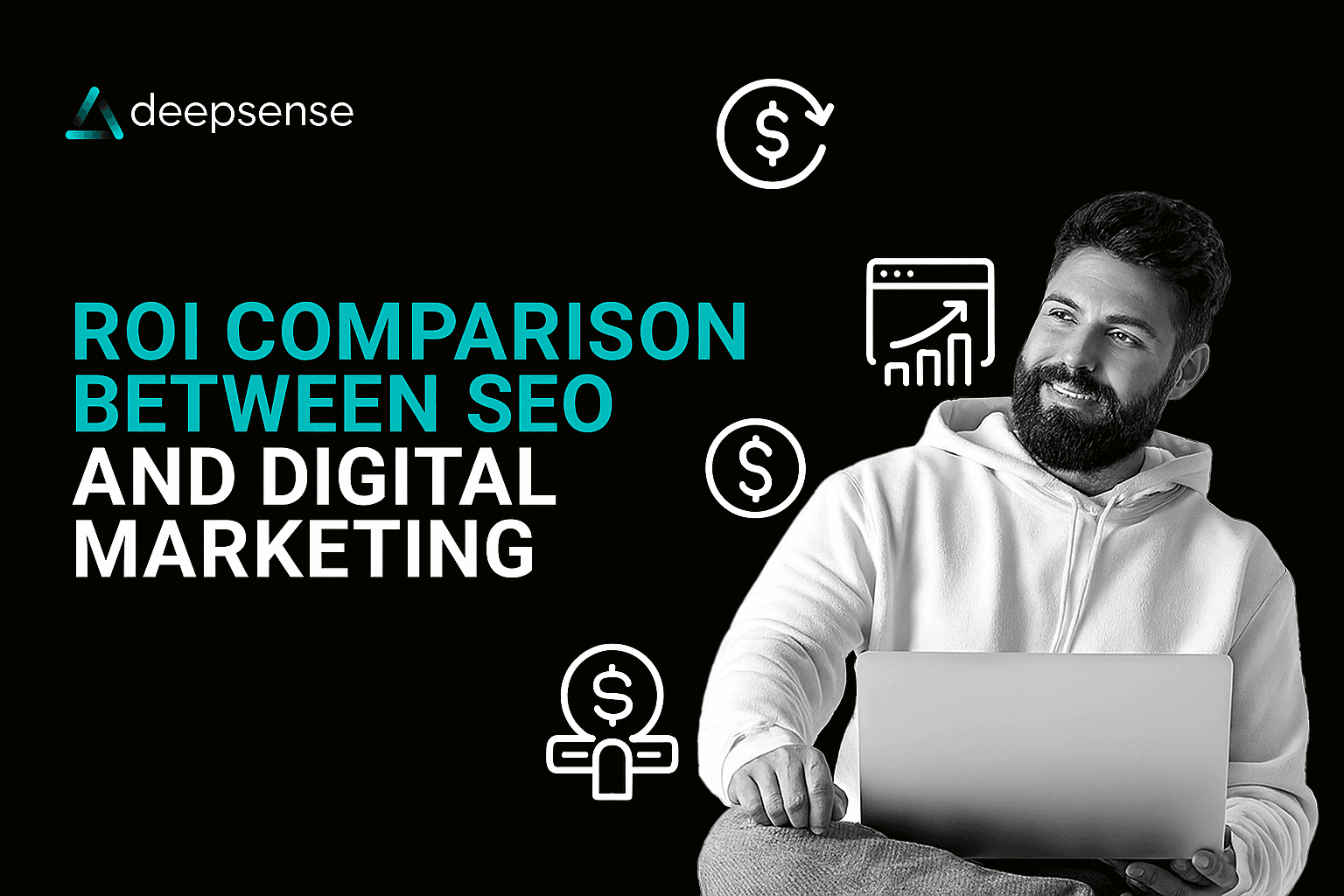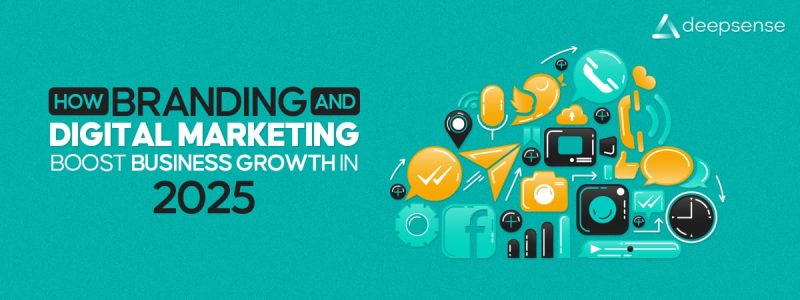Imagine you’ve just launched a brand-new business, maybe it’s a fashion store, a local service, or an online product. You’ve built a nice website, set up your Instagram, and you’re excited to get customers.
But then the real question hits you:
“How do I actually get people to find me online?”
You hear about SEO. You hear about Digital Marketing. One promises long-term results. The other gives instant visibility. But which one is really worth your money?
Let’s sit down and break this down together, no jargon, just clarity.
First, What is ROI and Why Should You Care?
ROI is short for Return on Investment, it simply tells you whether the money you spent on marketing brought in more money or not.
Think of it like this:
You spend ₹10,000 to run a campaign, and you make ₹30,000 in sales. That’s a 3x ROI, or a 200% return on what you put in.
ROI helps you understand what’s working, what’s a waste of money, and where to invest next.
Now, What’s the Difference Between SEO and Digital Marketing?
SEO (Search Engine Optimization)
SEO is like being the best student in class without raising your hand. You don’t shout for attention, you just quietly get noticed because you’re always present, relevant, and useful.
With SEO, you’re working on things like:
- Making your website Google-friendly
- Writing helpful blogs or product descriptions
- Using the right keywords that people search for
- Building links from other websites
Over time, SEO helps for Business your site appear organically when someone searches for something related to your business.
Example:
You run a skincare brand. Someone Googles “best organic face serum in India”, your blog or product page pops up, and they land on your site. That’s SEO magic.
Digital Marketing (Paid + Other Online Channels)
Digital Marketing is more like walking into a room and saying, “Hey! Look at me!” — but in a smart, targeted way.
It includes things like:
- Running ads on Google or Instagram
- Sending email campaigns
- Collaborating with influencers
- Doing remarketing
- Running WhatsApp or SMS promotions
Digital marketing is fast, flashy, and perfect when you want people to see your product now.
Example:
You launch a sale, you run Meta Ads to reach 10,000 people today. You get clicks, traffic, and (hopefully) sales in a few hours.
ROI Showdown: SEO vs. Digital Marketing
Let’s get into the juicy part: Which one gives you better ROI?
1. Cost of Starting
- SEO: You might pay for a writer, an SEO expert, or some tools. But you’re not paying for every click. It’s a one-time or consistent low-cost effort.
- Digital Marketing: You’ll pay every time someone clicks or views your ad. And the more competitive your industry, the more it costs.
Verdict: SEO is lighter on the wallet, especially in the long run.
2. How Quickly You See Results
- SEO: Like planting a tree. You won’t see much in the first few weeks, but once it grows… it’s solid.
- Digital Marketing: More like lighting a match. It burns bright, immediately, but only as long as there’s fuel (aka budget).
Verdict: Digital marketing wins if you need results right now.
3. How Long the Results Last
- SEO: A well-written blog or optimized page can bring traffic for months or even years without spending again.
- Digital Marketing: When you stop running ads, traffic disappears. No money = no clicks.
Verdict: SEO has staying power. It keeps giving, long after you stop feeding it.
4. Cost Per Lead or Customer
- SEO: Over time, the cost per customer drops significantly because your traffic grows naturally.
- Digital Marketing: Your cost per click or lead depends on bidding. In competitive markets (like fashion or real estate), it can get very expensive.
Verdict: SEO wins long-term with lower acquisition costs.
5. How Easy It Is to Scale
- SEO: Scaling SEO means creating more content, improving your website, and earning more backlinks, it takes time and expertise.
- Digital Marketing: Scaling is as simple as increasing your ad budget or expanding your targeting.
Verdict: Digital marketing is faster to scale, if you’ve got the cash.
Real Story, Real Insight
Let me paint two quick stories.
Story 1: A D2C Brand Focused on SEO
They invest in content, improve product descriptions, and do some basic technical fixes. For the first 3 months, it’s slow, barely a change.
But by month 6, their blog is ranking. Organic traffic triples. And now, without spending extra, they get 2,000+ visitors a day.
- Their sales go up
- Cost per lead goes down
- Their ROI? A solid 4x, and it’s still growing.
Story 2: A Startup That Relied Only on Ads
They spend ₹1 lakh per month on Meta and Google ads. The first month? Awesome. Tons of leads.
But by month 3, ad fatigue kicks in. Leads become costlier. They have to keep creating new creatives, new copies, new strategies.
When they pause their campaigns, boom. Silence.
- Their ROI? 2x
- But the minute they stop spending, sales dip.
So… Which One Should You Pick?
Here’s the honest answer: You don’t have to choose just one.
The smartest businesses do both:
- Use digital marketing for quick reach, testing offers, and sales now.
- Use SEO to build an organic foundation that supports your business in the long run.
Together, they’re unbeatable.
A Simple Cheat Sheet Based on Business Type
| Business Type | What Works Best |
| New Startups | Start with paid ads, slowly build SEO |
| Local Shops or Clinics | Focus on Local SEO + Google Ads |
| E-commerce | SEO for long-term growth + Paid ads for traffic |
| B2B | SEO blogs + Email marketing + LinkedIn ads |
| Seasonal Brands | Paid ads + SEO landing pages for specific campaigns |
Conclusion
If you’re looking for instant visibility, digital marketing is your best friend.
If you’re aiming for sustainable, long-term traffic, SEO is your soulmate.
But if you’re really playing the long game; building a brand, growing steadily, and protecting your marketing budget, then do both. Let paid ads bring people in today, and let SEO keep them coming back tomorrow.
FAQs
1. What’s the difference between SEO and digital marketing?
SEO focuses on improving your website’s visibility on search engines like Google organically (without paying per click), while digital marketing includes all paid and unpaid strategies like Google Ads, social media campaigns, email marketing, influencer marketing, etc.
2. Which gives better ROI — SEO or digital marketing?
It depends on your goals. Digital marketing gives faster results and ROI in the short term, while SEO offers a higher ROI in the long run as it keeps generating traffic without constant spending.
3. How long does it take for SEO to show results?
On average, SEO takes 3 to 6 months to start showing consistent results. It’s a long-term strategy but becomes more cost-effective over time.
4. Is digital marketing expensive compared to SEO?
Yes, especially if you’re running paid ad campaigns. You pay for each click or impression. SEO has a lower upfront cost and no ongoing cost per click once your pages rank.
5. Can I rely only on SEO or only on ads?
You can, but it’s not ideal. Relying only on SEO can take time, and relying only on ads can get expensive. The best ROI often comes from a combo of both, quick wins through ads + long-term traffic through SEO.
6. How do I measure ROI from SEO?
Use tools like Google Analytics, Search Console, or SEMrush to track traffic, conversions, and sales coming from organic search. Compare that to the cost of your SEO efforts to calculate ROI.
7. What kind of businesses benefit most from SEO?
All businesses can benefit, but especially:
- E-commerce stores
- Local service providers
- B2B companies
- Blogs and content-driven platforms
These thrive with steady, targeted organic traffic.
8. What happens if I stop investing in SEO or digital ads?
- If you stop SEO, your rankings may slowly drop if competitors outrank you.
- If you stop digital ads, your traffic stops immediately.
That’s why many businesses maintain a basic SEO effort alongside ad campaigns.
9. How much should I invest in SEO and digital marketing?
There’s no fixed number. Small businesses might start with ₹20,000–₹40,000/month on SEO and ₹30,000+ on ads. It depends on your goals, competition, and how fast you want results.
10. Should I hire an agency or do it in-house?
If you have the expertise, in-house teams offer more control. But if you’re looking for faster execution, expert insights, and tools, a good agency can help you get better ROI across both SEO and digital marketing channels.











